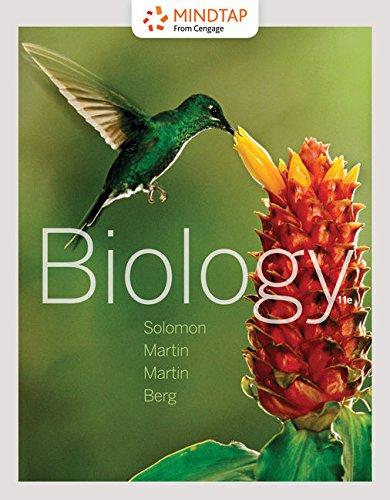
Introduction: The
Answer to Problem 1TYU
Correct answer: Cells are the structural and functional units and are the building block of organisms. Hence, the correct answer is option (c).
Explanation of Solution
Reason for correct answer:
The biological organization of organisms starts from atoms that are the smallest unit. Many atoms constitute molecules and many molecules constitute cells. All living organisms are made of cells including unicellular or multicellular. Several cells constitute a tissue. Thus, for all living organisms, cells are the structural building block.
Option (c) is given as “are the building blocks of living organisms”.
Cells are the building blocks of living organisms and they also make a tissue. Hence, the correct answer is option (c).
Reason for incorrect answer:
Option (a) is given as, “are not found among the bacteria”.
Bacteria are unicellular organisms made of a single cell. Hence, option a. is incorrect.
Option (b) is given as, “always have nuclei”.
Red blood cells seen in human beings lack a nucleus. Several microorganisms do not have nucleus, instead they have a nucleoid. Hence, option b. is incorrect.
Option (d) is given as, “are made up of tissues”.
Several cells that perform a common function constitute a tissue. Tissues do not constitute the cells. Hence, option d. is incorrect.
Option (e) is given as, “a and b are true”.
Bacteria are unicellular organisms made of a single cell. Red blood cells seen in human beings lack a nucleus. Several microorganisms do not have nucleus, instead they have a nucleiod. Options (a) and (b) are false. Hence, option (e) is incorrect.
Hence, the options (a), (b), (d), and (e) are incorrect.
Cells are the building blocks of living organisms and they also make a tissue.
Want to see more full solutions like this?
Chapter 1 Solutions
Mindtap Biology, 1 Term (6 Months) Printed Access Card For Solomon/martin/martin/berg's Biology, 11th
- Give examples of fat soluble and non-fat soluble hormonesarrow_forwardJust click view full document and register so you can see the whole document. how do i access this. following from the previous question; https://www.bartleby.com/questions-and-answers/hi-hi-with-this-unit-assessment-psy4406-tp4-report-assessment-material-case-stydu-ms-alecia-moore.-o/5e09906a-5101-4297-a8f7-49449b0bb5a7. on Google this image comes up and i have signed/ payed for the service and unable to access the full document. are you able to copy and past to this response. please see the screenshot from google page. unfortunality its not allowing me attch the image can you please show me the mathmetic calculation/ workout for the reult sectionarrow_forwardIn tabular form, differentiate between reversible and irreversible cell injury.arrow_forward
- 1.)What cross will result in half homozygous dominant offspring and half heterozygous offspring? 2.) What cross will result in all heterozygous offspring?arrow_forward1.Steroids like testosterone and estrogen are nonpolar and large (~18 carbons). Steroids diffuse through membranes without transporters. Compare and contrast the remaining substances and circle the three substances that can diffuse through a membrane the fastest, without a transporter. Put a square around the other substance that can also diffuse through a membrane (1000x slower but also without a transporter). Molecule Steroid H+ CO₂ Glucose (C6H12O6) H₂O Na+ N₂ Size (Small/Big) Big Nonpolar/Polar/ Nonpolar lonizedarrow_forwardwhat are the answer from the bookarrow_forward
- what is lung cancer why plants removes liquid water intead water vapoursarrow_forward*Example 2: Tracing the path of an autosomal dominant trait Trait: Neurofibromatosis Forms of the trait: The dominant form is neurofibromatosis, caused by the production of an abnormal form of the protein neurofibromin. Affected individuals show spots of abnormal skin pigmentation and non-cancerous tumors that can interfere with the nervous system and cause blindness. Some tumors can convert to a cancerous form. i The recessive form is a normal protein - in other words, no neurofibromatosis.moovi A typical pedigree for a family that carries neurofibromatosis is shown below. Note that carriers are not indicated with half-colored shapes in this chart. Use the letter "N" to indicate the dominant neurofibromatosis allele, and the letter "n" for the normal allele. Nn nn nn 2 nn Nn A 3 N-arrow_forwardI want to be a super nutrition guy what u guys like recommend mearrow_forward

 Biology Today and Tomorrow without Physiology (Mi...BiologyISBN:9781305117396Author:Cecie Starr, Christine Evers, Lisa StarrPublisher:Cengage Learning
Biology Today and Tomorrow without Physiology (Mi...BiologyISBN:9781305117396Author:Cecie Starr, Christine Evers, Lisa StarrPublisher:Cengage Learning Biology (MindTap Course List)BiologyISBN:9781337392938Author:Eldra Solomon, Charles Martin, Diana W. Martin, Linda R. BergPublisher:Cengage Learning
Biology (MindTap Course List)BiologyISBN:9781337392938Author:Eldra Solomon, Charles Martin, Diana W. Martin, Linda R. BergPublisher:Cengage Learning Biology: The Dynamic Science (MindTap Course List)BiologyISBN:9781305389892Author:Peter J. Russell, Paul E. Hertz, Beverly McMillanPublisher:Cengage Learning
Biology: The Dynamic Science (MindTap Course List)BiologyISBN:9781305389892Author:Peter J. Russell, Paul E. Hertz, Beverly McMillanPublisher:Cengage Learning Concepts of BiologyBiologyISBN:9781938168116Author:Samantha Fowler, Rebecca Roush, James WisePublisher:OpenStax College
Concepts of BiologyBiologyISBN:9781938168116Author:Samantha Fowler, Rebecca Roush, James WisePublisher:OpenStax College Human Physiology: From Cells to Systems (MindTap ...BiologyISBN:9781285866932Author:Lauralee SherwoodPublisher:Cengage Learning
Human Physiology: From Cells to Systems (MindTap ...BiologyISBN:9781285866932Author:Lauralee SherwoodPublisher:Cengage Learning





